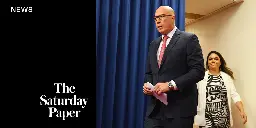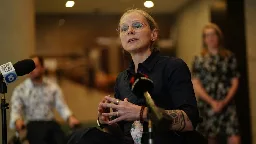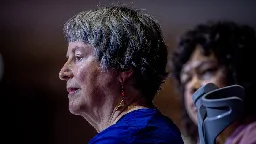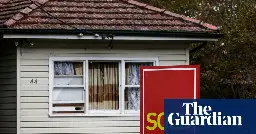Me in Australia: finally something we're ahead of everyone on
If the UK had a preferential voting system the Tories would have won a lot more seats
It feels like our public health systems have gone backwards since covid. Not because we don't have the skills and resources, but because of ideology.
If you interpret the appendix as an ending then it's a lot less pessimistic as it implies that all totalitarian regimes eventually fall.
I'm a trauma researcher. So many people shouldn't have kids.
I have a bachelors in psychology so was able to pick based on my understanding of approaches. I knew I didn't want CBT, so went with an ACT psych instead. Mine is also a developmental psychologist so I knew they'd be more likely to understand neurodevelopmental disabilities than your average psychologist.
I'm Audhd and pretty much use my psychologist for all of this.
It's interesting that people want daylight savings in qld during summer because we spend most of summer wanting the sun to fuck off.
Earthquakes
Fuck this was depressing to read. Validating though.
Amazing public relations campaign if this is all part of a marketing thing.
The boomers have been really successfull in simultaneously punching down across the generations and making us punch down on each other at the same time.
We have a small population and mandatory voting means everyone gets a vote by default. We also have a different culture around voting because the majority of us have to do it. We have sausage sizzles and democracy dogs. I've personally worked at polls all over my state and there's never been a line longer than 10 people. It takes most people like 5 mins max to vote. We make voting easy in Australia because everyone has to do it.
It's worth noting that it's not all that mandatory. It's relatively easy to simply avoid enrolling to vote. You're not automatically enrolled in other words. Also it's really easy to just sign your name off at the poll and hand in a blank vote. The worst outcome of not voting is a fine that you can pretty easily get out of as well.
Gonna throw a hat in the ring here for the British Empire as the king of genocide.
As an autistic person that's a double fuck you from me
Wonder if he got this advice from his dog
Subjectification. People normalise what's normal for them.
Surely this is intersectional though right? Not all men are the same or have the same experience of political issues. I can see how straight white cis men might feel like these spaces aren't for them. But queer men might feel differently about this. Black men also.
Also if you feel like existing spaces aren't for you, then free to create your own spaces. There's nothing holding you back.
We do the queen/king's bday on a different date to whatever the current Monarch's actual bday is. Surely we could just do the same thing with any of these other dates.
Some media and Coalition politicians have voiced outrage over the decision, which the retailer says is due to lack of customer demand

Cabinet papers from 2003 show there was no formal submission before decision was taken to join US-led ‘coalition of the willing’

Some bosses are tying bonuses to getting people back into the office. But with "work from home" the most searched-for term on job websites, the push-and-pull is a source of contention.

Enrolments in bachelor degrees dropped from 934,000 in 2016 to 815,000 in 2022

Pricey entertainment subscription services are getting the chop from more Aussie households as consumers turn to free or cheaper ad-based content for entertainment, a new report reveals.

Former Australian prime minister tells right-wing conference that immigrants should ‘adopt the values and practices’ of their new country

After a week of silence, leading ‘Yes’ campaigners have begun to detail three ways forward for the movement – including fighting to keep Peter Dutton out of office.

After a week of silence, leading ‘Yes’ campaigners have begun to detail three ways forward for the movement – including fighting to keep Peter Dutton out of office.
After an inquiry lasting four-and-a-half years, the royal commission makes 222 recommendations for change.

The disability royal commission made 222 recommendations for change The commissioners were split on key areas like education, work and group homes The government has set up a taskforce, but gave no immediate response to the recommendations
Superannuation and property investment fuels growing inequality, with the richest fifth worth an average of $3.2m

University application first preferences dropped almost 20% this year, compared with 2023

I don't blame them but fuck this is scary.
The fracas in the wake of comments by Marcia Langton suggests a necessary conversation – led by people with lived experience – is still out of bounds

There are fears in the Australian community that disability is "infecting" and interfering with the lives of non-disabled people, a disability royal commissioner has told its closing ceremony in Sydney.

Key points:
- The disability royal commission is wrapping up after four-and-a-half years
- Emotions ran high at the commission's ceremonial closing, attended by people with disability from across the country
- The inquiry's chair says the media hasn't given the inquiry the attention it deserves
Solidarity with all my fellow disabled folks today.
Greens leader Adam Bandt and housing spokesperson Max Chandler-Mather say minor party will now support Housing Australia Future Fund

Greens leader Adam Bandt and housing spokesperson Max Chandler-Mather say minor party will now support Housing Australia Future Fund
Roy Morgan research shows 1.5 million people – almost a third of all mortgage holders – are spending 25 to 45% of their income on their home loan

We live amid the wreckage of formerly treasured institutions and services, despoiled by decades of marketisation and neglect

On Monday, unionised workers at the University of Melbourne (where I teach) will go on strike. In the faculty of arts, the Melbourne law school, student services and library services we’ll stay out for a week – longer than any previous dispute at an Australian university.
Readers of a certain age might marvel at the recent wave of industrial action in higher education, perhaps remembering their own campus days with fond nostalgia.
But the system they recall no longer exists.
Across the sector, casual and sessional staff now deliver between 50% and 80% of undergraduate teaching. Many tutors don’t know from semester to semester whether they’ll have jobs – an insecurity that can last decades. Often they work at multiple institutions, assembling a patchwork of contracts through which to support themselves.
Naturally, such conditions affect students, many of whom now face the unexpected indexation of the huge debts they’ve run up to attend higher education in Australia – and in return receive minimal attention from staff. In some places, sessional employees have been allocated just 10 minutes to read an assignment and provide feedback.
Widespread precarity has facilitated a culture of illegal underpayment, with more than $80m in underpayments uncovered since 2020 across public universities, according to the National Tertiary Education Union’s wage theft report. The University of Melbourne alone has been forced to repay $45m in stolen wages.
Both permanent and casual staff report being constantly overworked. A recent open letter signed by more than 100 members of the Melbourne law school says: “In our experience … many full-time employees work well in excess of 50 hours per week; many part-time employees work full-time hours; and increasingly, we hear of colleagues working during annual and long service leave and not taking sick leave when ill.”
How did higher education get so broken? Pretty much the same way as everything else. We live amid the wreckage of formerly treasured institutions and services, despoiled by decades of marketisation and neglect.
Think of universal healthcare, something of which Australians were once rightly proud. Like education, the system looks serviceable enough if you squint at it from the outside. But behind the veneer, healthcare workers report ongoing staff shortages in chronically underfunded hospitals, with beds often unavailable and emergency departments stretched beyond capacity.
Back in 1945, Ben Chifley explained that every man and woman possessed “an indefeasible right” to social security.
“Deprivation of those rights or whittling down of the terms of those provisions would,” he said, “be a breach of trust with the whole Australian nation.”
Today, in a far, far richer country than Chifley could ever have imagined, the majority of those receiving jobseeker and parenting payments live below the Henderson poverty line. As a recent government report explained, many of the unemployed lack the ability to meet “the essentials of life”.
During the second world war, the old Commonwealth Housing Commission described the provision of affordable housing as a fundamental responsibility of government. “We consider,” it explained, “that a dwelling of good standard and equipment is not only the need but the right of every citizen – whether the dwelling is to be rented or purchased, no tenant or purchaser should be exploited for excessive profit.”
In 2023, almost three-quarters of young people believe they’ll never own a home. As for rent, Anglicare’s Kasy Chambers says bluntly: “Virtually no part of Australia is affordable for aged care workers, early childhood educators, cleaners, nurses and many other essential workers we rely on.”
Once upon a time, even Bob Menzies could urge funding for universities on the basis that they upheld “values which are other than pecuniary”.
But Menzies’ Tory paternalism suffered the same fate as Curtin and Chifley’s social democratic reformism, supplanted by a philosophy that considers “values other than pecuniary” a category error.
Higher education duly evolved into a huge industry, raking in billions from the lucrative overseas student market. Jockeying for profit, the universities employed the same strategies as other corporations, spending millions on consultants, including from scandal-ridden companies like PwC.
FOI documents from 2018-19 and 2019-20 revealed the extraordinary remuneration of top university executives: the 50 highest-paid employees at Sydney, Queensland and UNSW took home $350,000 a year, even before super and other benefits.
Many vice-chancellors receive huge bonuses on top of their already engorged salaries.
The University of Sydney pays Mark Scott a salary of $1.1m including bonuses; at Melbourne University, Duncan Maskell takes home $1.5m annually. Yet both Sydney and Melbourne feature among the worst-rated campuses in surveys of undergraduate experiences.
It doesn’t have to be like this. We don’t have to accept the transformation of our institutions into corporations enriching the few while others have to strike for basic conditions. If previous generations could imagine services wholly dedicated to the public good, there’s no reason why we can’t do the same.
